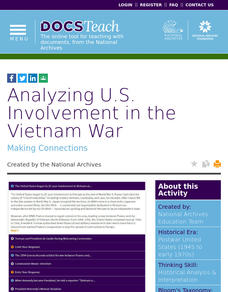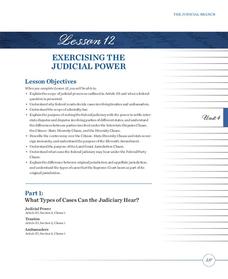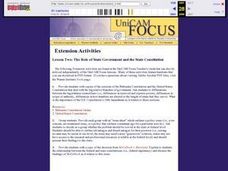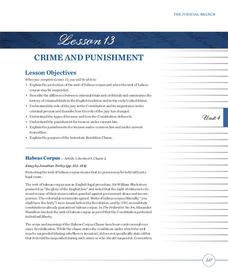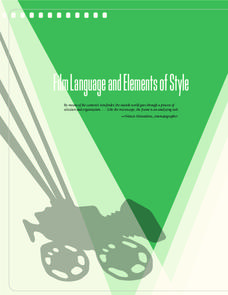Council for Economic Education
Satisfaction Please! (Part 3)
Understanding the US government's role proves very important in the American economy, especially for consumers. Scholars learn about how varying government agencies help them when facing an issue. The third and final resource in the...
NPR
Civil Rights of Japanese-American Internees
Prompted by a viewing of Emiko and Chizu Omori’s Rabbit in the Moon, a documentary about the internment of Japanese-Americans during World War II, high schoolers examine a series of documents, including the Bill of Rights and the UN’s...
Curated OER
Is Gulf War Syndrome a Significant Health Issue the U.S. Government has Tried to Cover Up?
Young scholars examine the issues surrounding Gulf War Syndrome. In groups, they analyze evidence from the war and medical information. They participate in a debate in which they support their feelings on whether the government of the...
Curated OER
Political Issues and Opinions
The emergent adults in your US Government class can become informed, self-aware voters. This activity enables them to form an opinion about particular political issues then identify themselves on the political spectrum. Informed and...
School Improvement in Maryland
Building a Pyramid
After reviewing the structure and powers of the three branches of the US government, groups investigate a problem and research what is being done to address this criticism.
Curated OER
Lesson 4: The Judiciary: A Brief Introduction to the Courts System
Focusing on the judicial branch of government, the fourth lesson in this series explores the structure of the US courts system. Beginning with an engaging activity based on the short story The Lady or the Tiger, students go on to examine...
Smithsonian Institution
Native Resistance: Native Resistance Then and Now
Native Americans lost so much—and gained so little in return. Scholars explore Native Americans' resistance to the United States government. The lesson uses primary sources to explore the different forms of protest and gives a voice to...
Center for Civic Education
Constitution Day Rap
Engage your class while learning about the US Constitution with this fun primary grade social studies lesson. After viewing a picture of the US Constitution, young learners piece together a US flag using stars and stripes with facts...
DocsTeach
Analyzing US Involvement in the Vietnam War
War: unavoidable or a necessary evil? A thought-provoking activity explores the United States' long involvement in the Vietnam War as well as the aftermath. Scholars research and summarize primary documents and complete online worksheets...
DocsTeach
Integration of the US Armed Forces
Uncle Sam wants you to integrate the military! The activity uses images and documents to help scholars understand the integration of African Americans into the mainstream military. Academics analyze a series of military photos and...
Oakwood Publishing
Workshop 4: Constitutional Convention
How do new amendments become part of the US Constitution? AP government students explore, analyze, and use the US Constitution to develop a deep understanding of the interworkings of law and government while practicing synthesis and...
Street Law
The Challenge of Selecting an Ideal Supreme Court Nominee
Nearly every president has had the opportunity to name a nominee to the United States Supreme Court. But what makes someone an ideal candidate to become a Supreme Court justice? High schoolers test their prior knowledge about the Supreme...
Heritage Foundation
Exercising Judicial Power
We should all do more exercising, but should the judicial branch as well? High schoolers develop their understanding of what powers the judicial branch carries because of the US Constitution, as well as where their limits lie in the...
Curated OER
Power and Authority
Fourth graders study authority and power as its used in government. In this government lesson plan, 4th graders define power and authority. Students then read different scenarios of authority and power examples in people as well as...
Curated OER
The Role of State Government and the State Constitution
Students examine sections of the Nebraska Constitution and the U.S. Constitution, and compare/contrast the two. They research policy issues, and decide whether they should be solved at the state or federal level.
Heritage Foundation
Crime and Punishment
You wouldn't give someone a 10-day timeout for eating a piece of candy. The US government, too, does not believe in unreasonable punishment. A variety of exercises exploring the clauses of the US Constitution prompts class members to...
Annenberg Foundation
Controversial Issues in Practice
Wow! This resource provides three related lessons on the First Amendment that challenge US government students to explore their personal opinion on the separation of church and state. Each lesson can be adjusted in length, but is...
Curated OER
We the People
Middle schoolers create a map illustrating the three branches of goverment. They identify the branches of government and the shared or exclusive powers of each. Students use mapping as a prewriting stategy. They discuss our national...
Heritage Foundation
Courts and Judges
If the Supreme Court is so supreme, why do all cases not just start there? High schoolers learn why every case does not start at the Supreme Court as well as the importance of hierarchy in the US judicial system in the 11th installment...
Film Foundation
Film Language and Elements of Style
How do you read a frame? How do you read a shot? Here's a resource that shows viewers how to read films. As part of the study, class members examine the camera angles, lighting, movement, and cinematic point of view in Mr. Smith Goes to...
Curated OER
Government
High schoolers evaluate how the United States government has maintained a balance between protecting rights and maintaining order. They analyze the impact of Supreme Court decisions on governmental powers and the rights and...
Curated OER
ONE VOTE
In order to understand the political process and the importance of voting, pupils will construct a class time line. They will group up and research a specific era, creating a time line of political events where one vote made a...
Curated OER
Little House in the Census: Almanzo and Laura Ingalls Wilder
How would you use census data from 1880-1900? Here are a set of ways you can incorporate the book Little House on the Prairie and US census data from that time period. Learners will research the validity or the book based on factual...
Curated OER
Photography and the National Park Service
During the 1800s the United States was expanding westward; land was there for the taking. Kids explore how some early photographers used their photography to influenced the US Congress to save areas like Mirror Lake. They complete a...
Other popular searches
- Us Government Answers
- Branches of Us Government
- Us Government Branches
- Us Government Review Game
- Philosophy of Us Government
- Us Government Quizes
- Us Government Lessons
- Beginnings of Us Government
- Ap Us Government
- Us Government Quiz Es
- Us Government Agencies
- Us Government Lessons'










